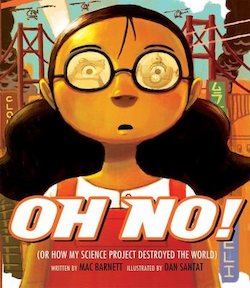The following lesson plan involves making predictions. The lesson is intended to be a literacy lesson for science, but can be adapted to language arts and other subject areas. A science picture book is used, but the lesson can be adapted to any other book, preferably a children's book.
Title: Picture Book Read Aloud and Prediction Making
Subject: Science/Language Arts; can be adapted for any subject
Grade Level: 5th Grade, can be adapted for other grade levels.
Subject: Science/Language Arts; can be adapted for any subject
Grade Level: 5th Grade, can be adapted for other grade levels.
Objectives: Students will be able to make predictions based on what occurs in the text and illustrations.
Procedures:
- Show the students the cover to the picture book Oh No! (Or How My Science Project Destroyed the World). Based on the what is on the cover only, have the students make predictions about what they think the book will be about. Have them predict setting, characters, problem, solution etc. Students will predict as many things as possible, even though they know nothing about the story.
- Read the story out loud and show the students the illustrations (most of the story is illustations). Every couple pages, ask the class to predict what will happen next. Have them write down their predictions, and have a few of them share their predictions.
- After reading a few more pages, ask if their predictions were correct.
- Continue the process by modifying predictions and checking their predictions by reading on.
Materials: Picture Book: Oh No! (Or How My Science Project Destroyed the World). This lesson can be adapted to any book. If you are planning on using this lesson plan for a science class, here is a list of other science fiction picture books that the lesson could be adapted to.
Assessment: Listen to the students who are sharing predictions out loud. Then, collect the lists of the students' predictions.


